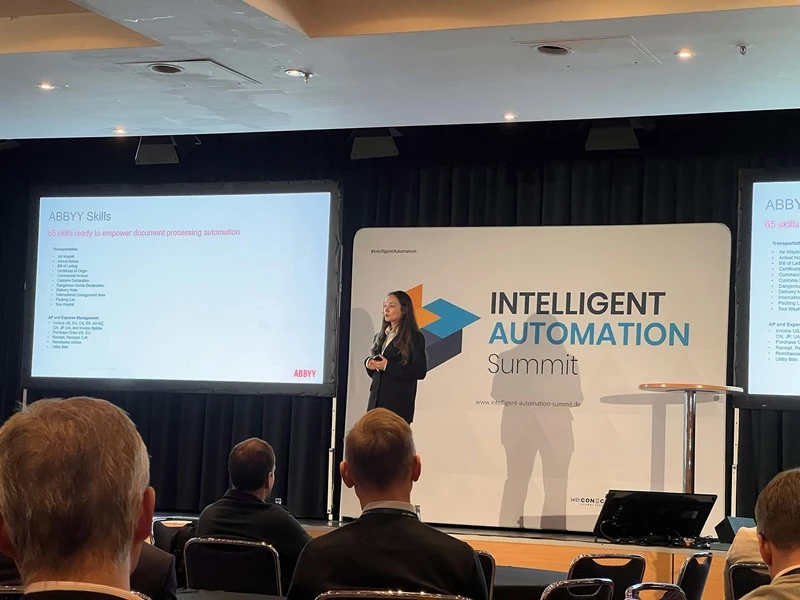
Enhance Site Functionality with Our Cookiebot Integration Solutions

Enhance Site Functionality with Our Cookiebot Integration Solutions
Back to The Intelligent Enterprise
Frequently Asked Questions About Artificial Intelligence (AI)
by Alina Sysko, Senior Solution Consultant
As organizations inch closer to maturity in their use of advanced artificial intelligence platforms, it is crucial to make these distinctions between what’s available on the market. The keys to successful AI and intelligent automation initiatives are setting clear goals, measuring success, and using AI with a specific purpose in mind.
Leaders in IT, automation, and artificial intelligence gathered in Berlin for the 2023 Intelligent Automation Summit this past November, gaining insight into the latest developments in innovation that are transforming how modern organizations pursue operational excellence in their business.
As a leader in purpose-built AI for intelligent automation, ABBYY hosted an informative session exploring how enterprises are putting their information to work with intelligent document processing (IDP) to drive efficiency. I was honored to lead that session.
As an example, I walked through ABBYY’s success with leading brewery group Carlsberg , who saved 140 hours of work a month by achieving a touchless order processing rate of 92 percent using ABBYY IDP. Not only did this transform Carlsberg’s order and delivery process, but it drastically enhanced visibility of end-to-end operations overall.
This understandably piqued the interest of IA Summit attendees, who demonstrated curiosity in the nuances of artificial intelligence such as machine learning, large language models (LLMs), and ABBYY’s position in the current AI landscape.
Here’s what customers wanted to know, and the answers to their questions:

What is the difference between deep machine learning and fast machine learning, and what kinds of documents do they apply to?
Machine learning (ML) is the capability of advanced AI models to train and adapt to certain tasks via repetition to improve outcomes over time. Beneath this term are variants of machine learning that are applied to different contexts—two such variants are deep machine learning and fast machine learning.
Fast machine learning is an algorithmic-based approach that analyzes a relatively small quantity of data and rapidly accelerates its classification and clustering. This allows for more agile handling of large volumes of documents, such as invoices. While an organization might have previously had to build a database to manually classify tens and thousands of invoices, fast ML enables automated clustering and classification by quantifying the documents’ similarity. Fast ML is best used to handle large sets of similar documents.
Deep machine learning leverages neural networks to support a wider breadth of capabilities, such as image preprocessing, document layout analysis, and optical character recognition (OCR). Deep ML often processes larger sets of data and offers more variety in its output, including sentiment analysis or summarization. Deep ML is best applied when processing a variety of structured and unstructured data.
Intelligent Enterprise
Are Large Language Models (LLMs) the Future?
How is ABBYY different from OpenAI and other companies talking about LLMs and AI?
OpenAI is widely known for its generative AI platform ChatGPT, which became available to consumers in late November of 2022. ChatGPT quickly gained popularity due to its shocking versatility, accessibility, and responsiveness to plain-language inputs, thus sparking the influx of hype that took AI from a relatively niche technological interest to a colloquially well-known topic fit for dinner conversations and IT department meetings alike.
ChatGPT is a generative AI platform and an LLM, meaning it navigates vast stores of data to yield humanlike responses to text-based user queries. Despite its impressive nature, ChatGPT’s predisposition to purport and hallucinate misinformation has made it a contentious topic among AI stakeholders. This is a result of its general-purpose nature, as the platform struggles to accurately navigate its own massive knowledge base.
Here is where we’ll find the difference between the AI solutions of OpenAI and ABBYY. While OpenAI has prioritized a general-purpose AI model, ABBYY prioritizes specialized, or “purpose-built” AI.
ABBYY is a developer of specialized solutions that can be trained for contextual understanding and the accurate, autonomous extraction of critical information from business documents. By leveraging machine learning and natural language processing, ABBYY IDP solutions can be trained by processing volumes of documents to increase accuracy over time and reduce the need for manual intervention in business processes by humans. Training purpose-built AI platforms enhances their ability to handle increasingly complex and specific documents, making it more effective in yielding demonstrable business results without the added risks to privacy, ethics, and energy consumption associated with generative AI.
Navigating AI’s place in your organization
As organizations inch closer to maturity in their use of advanced artificial intelligence platforms, it is crucial to make these distinctions between what’s available on the market. The keys to successful AI and intelligent automation initiatives are setting clear goals, measuring success, and using AI with a specific purpose in mind. Considering the insightful questions asked by attendees at the 2023 Intelligent Automation Summit, it’s clear that many customers are on the right trajectory toward operational excellence.
Read more about ABBYY’s purpose-built and AI-driven intelligent document processing solution ABBYY Vantage .
Subscribe for updates
Get updated on the latest insights and perspectives for business & technology leaders
First name*
Last name
E-mail*
Сountry*
СountryAfghanistanAland IslandsAlbaniaAlgeriaAmerican SamoaAndorraAngolaAnguillaAntarcticaAntigua and BarbudaArgentinaArmeniaArubaAustraliaAustriaAzerbaijanBahamasBahrainBangladeshBarbadosBelgiumBelizeBeninBermudaBhutanBoliviaBonaire, Sint Eustatius and SabaBosnia and HerzegovinaBotswanaBouvet IslandBrazilBritish Indian Ocean TerritoryBritish Virgin IslandsBrunei DarussalamBulgariaBurkina FasoBurundiCambodiaCameroonCanadaCape VerdeCayman IslandsCentral African RepublicChadChileChinaChristmas IslandCocos (Keeling) IslandsColombiaComorosCongo (Brazzaville)Congo, (Kinshasa)Cook IslandsCosta RicaCroatiaCuraçaoCyprusCzech RepublicCôte d’IvoireDenmarkDjiboutiDominicaDominican RepublicEcuadorEgyptEl SalvadorEquatorial GuineaEritreaEstoniaEthiopiaFalkland Islands (Malvinas)Faroe IslandsFijiFinlandFranceFrench GuianaFrench PolynesiaFrench Southern TerritoriesGabonGambiaGeorgiaGermanyGhanaGibraltarGreeceGreenlandGrenadaGuadeloupeGuamGuatemalaGuernseyGuineaGuinea-BissauGuyanaHaitiHeard and Mcdonald IslandsHoly See (Vatican City State)HondurasHong Kong, SAR ChinaHungaryIcelandIndiaIndonesiaIraqIrelandIsle of ManIsraelITJamaicaJapanJerseyJordanKazakhstanKenyaKiribatiKorea (South)KuwaitKyrgyzstanLao PDRLatviaLebanonLesothoLiberiaLibyaLiechtensteinLithuaniaLuxembourgMacao, SAR ChinaMacedonia, Republic ofMadagascarMalawiMalaysiaMaldivesMaliMaltaMarshall IslandsMartiniqueMauritaniaMauritiusMayotteMexicoMicronesia, Federated States ofMoldovaMonacoMongoliaMontenegroMontserratMoroccoMozambiqueMyanmarNamibiaNauruNepalNetherlandsNetherlands AntillesNew CaledoniaNew ZealandNicaraguaNigerNigeriaNiueNorfolk IslandNorthern Mariana IslandsNorwayOmanPakistanPalauPalestinian TerritoryPanamaPapua New GuineaParaguayPeruPhilippinesPitcairnPolandPortugalPuerto RicoQatarRomaniaRwandaRéunionSaint HelenaSaint Kitts and NevisSaint LuciaSaint Pierre and MiquelonSaint Vincent and GrenadinesSaint-BarthélemySaint-Martin (French part)SamoaSan MarinoSao Tome and PrincipeSaudi ArabiaSenegalSerbiaSeychellesSierra LeoneSingaporeSint Maarten (Dutch part)SlovakiaSloveniaSolomon IslandsSouth AfricaSouth Georgia and the South Sandwich IslandsSouth SudanSpainSri LankaSurinameSvalbard and Jan Mayen IslandsSwazilandSwedenSwitzerlandTaiwan, Republic of ChinaTajikistanTanzania, United Republic ofThailandTimor-LesteTogoTokelauTongaTrinidad and TobagoTunisiaTurkeyTurks and Caicos IslandsTuvaluUgandaUkraineUnited Arab EmiratesUnited KingdomUnited States of AmericaUruguayUS Minor Outlying IslandsUzbekistanVanuatuVenezuela (Bolivarian Republic)Viet NamVirgin Islands, USWallis and Futuna IslandsWestern SaharaZambiaZimbabwe
I have read and agree with the Privacy policy and the Cookie policy .*
I agree to receive email updates from ABBYY Solutions Ltd. such as news related to ABBYY Solutions Ltd. products and technologies, invitations to events and webinars, and information about whitepapers and content related to ABBYY Solutions Ltd. products and services.
I am aware that my consent could be revoked at any time by clicking the unsubscribe link inside any email received from ABBYY Solutions Ltd. or via ABBYY Data Subject Access Rights Form .
Referrer
Query string
GA Client ID
UTM Campaign Name
UTM Source
UTM Medium
UTM Content
ITM Source
Page URL
Captcha Score
Connect with us
Also read:
- [New] 2024 Approved Miniature Homes 6 Top Oriental Designs for MCers
- [New] Inside Vidma A New Chapter in Video Capture Tech for 2024
- [New] Transform Your Videography Using YouTube to Boost Visual Clarity
- [Updated] In 2024, Conversational Flow in Cinematic Storytelling
- [Updated] Quick Adaptation Video Size to Mac Screen Proportion
- 13 Pro? | Tech Insights
- Astonishing Freeness of Screen Dance Duels
- Best Protection for Your iPhone SE in 202N: The Top Case Picks You Need to Know
- Discover the Secret Siri Shortcuts: Unleash New Powers on Your iPhone | ZDNet
- Exclusive Review: Top-Rated Apple's Own iPhone Case - A Test of Endurance & Innovative Protective Design
- In 2024, Live Stream Reader
- Samsung Galaxy S23 and iPhone 14 Face-Off: Deciding Which Smartphone Reigns Supreme in the Tech World | Expert Analysis
- Say Hello, Not Goodbye: Apple Unveils Alternative Media Apps for Windows Users | ZDNet Coverage
- Spiritual Care at the End of Life | Free Book
- The Ultimate Guide How to Bypass Swipe Screen to Unlock on Xiaomi Civi 3 Device
- Three Simple Tactics to Block Unwanted Messages on iPhones, Featured
- Ultimate Guide to the Latest AirTag Peripherals: Featured Picks , Tested and Analyzed | ZDNet
- Title: Enhance Site Functionality with Our Cookiebot Integration Solutions
- Author: Donald
- Created at : 2025-01-28 21:33:32
- Updated at : 2025-01-31 19:35:34
- Link: https://some-tips.techidaily.com/enhance-site-functionality-with-our-cookiebot-integration-solutions/
- License: This work is licensed under CC BY-NC-SA 4.0.